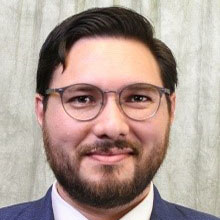NIH postbaccalaureate fellowship programs provide trainees with a full-time biomedical research experience. This experience includes hands-on biomedical research, mentorship, and career development opportunities. Trainees are encouraged to participate in career development activities and take full advantage of the NIH scientific community and training programs.
Meet Current NIMHD Postbaccalaureate Students
2020

Aniruddh Ajith, B.S.,
is a post-baccalaureate Intramural Research Training Award (IRTA) fellow at the National Institute on Minority Health and Health Disparities (NIMHD). Aniruddh is working under the direction of Dr. Kelvin Choi on research projects related to the possible effects of smoking coupons on smoking behaviors and tobacco-related health disparities among minority populations. Aniruddh is particularly interested in using electroencephalogram (EEG) to understand how smokers may perceive smoking coupons and how smoking coupons perpetuate smoking behaviors. Aniruddh is also examining how smoking during adolescence correlates with intergenerational educational mobility, and therefore with health and socioeconomic disparities. Aniruddh received his Bachelor of Science degrees in Physiology and Neurobiology, and Psychology from the University of Maryland, College-Park.

Zahra Ansari, B.S.,
is a postbaccalaureate research fellow in the Digital Health and Health Disparities lab. She received her bachelor’s degree in public health from the University of California, Berkeley in May 2019. At Berkeley, Zahra conducted research on the best outreach methods for colorectal cancer screening in South Asians. There, she oversaw planning and executing culturally tailored interventions to combat low screening rates among South Asians in the Bay Area. Now at NIMHD, Zahra works with Dr. Sherine El-Toukhy to study how best to leverage health technology to bridge health disparities.

Jackie Bonilla, B.S.,
is a post-baccalaureate fellow working with Drs. Anna Nápoles and Rose Ramos. Her research interests include investigating patient-provider communication and how it influences health outcomes among minority populations. In addition, she is interested in studying social determinants of health and health-related quality of life among minority populations. Currently, Ms. Bonilla is investigating how patient engagement in cancer care can impact patient satisfaction and quality of life among Latina breast cancer survivors. She is also examining how returning research results to participants can potentially impact willingness to participate in future studies. Ms. Bonilla received a bachelor’s degree in biology with a minor in public health from the University of Georgia in 2019.

Aaron Broun ,
is a post-baccalaureate fellow working with Dr. Kelvin Choi. His research interests include developmental disparities, interpersonal relationships, mental health, and health behavior. He is currently studying the effects of parental support on changes in tobacco use behavior during adolescence. He is also working on a study investigating the psychological, behavioral and physiological effects of direct mail tobacco advertisements by socioeconomic status. In addition, he is working with collaborators at University of Maryland on an EEG study related to tobacco use. Mr. Broun received a bachelor’s degree in biology and psychology from Oberlin College in 2017. He spent a year at NIDDK studying epigenetic mechanisms of transcriptional regulation before joining NIMHD.

Isaiah Brown, B.S.,
is a post-baccalaureate fellow working with Dr. Sharon Jackson. Mr. Brown is conducting research focused on identifying the relationships between health access and health care seeking behaviors that could help explain disparities among those living with chronic diseases, such as type 2 diabetes. Mr. Brown’s other research interests include mental health, residential displacement, and health systems. Mr. Brown is also a part of the NIH Academy, where he actively learns about health disparities through community service and journal discussions. Mr. Brown received a bachelor’s degree in neuroscience from the University of Kentucky. Before joining NIMHD, he spent time at the University of Kentucky studying Parkinson’s disease and other neurodegenerative diseases under the direction of Dr. Greg Gerhardt. Additionally, Mr. Brown completed an internship at the University of Southern California’s Keck School of Medicine, where he studied metabolic disease as a part of the Summer Program in Diabetes and Obesity Research (SPIDOR).

Saida Coreas, B.S.,
is a post-baccalaureate Intramural Research Training Award (IRTA) fellow working in the Division of Intramural Research at the National Heart Lung and Blood Institute (NHLBI) under Dr. Eliseo J. Pérez-Stable. Her research interests include understanding how factors relating to social determinants of health influence tobacco use among minority populations. Ms. Coreas is currently working on research projects related to tobacco use behaviors and tobacco related disparities among minority populations. Specifically, Ms. Coreas is looking at racial/ethnic differences in tobacco products use patterns among U.S. adults, as well as relationships between cigarette smoking susceptibility and smoking initiation among U.S. youth. Ms. Coreas received her Bachelor of Science in Public Health from California State University, Los Angeles in 2018.

Koya Ferrell, M.S.,
is a post-baccalaureate fellow working under the mentorship of Dr. Sharon Jackson. Her research interests involve understanding how social determinants of health and health behaviors can impact disease progression. Koya is a member of the NIH Academy 2019-2020 cohort where she is developing a deeper understanding of health disparities and how they interact with diverse communities. Previously, Koya worked as a pathways intern with the Office of Grants Management at the National Heart, Lung, and Blood Institute. Ms. Ferrell received her Bachelor of Arts in Psychology from Spelman College in 2016 and her Master of Science in Physiology and Biophysics from Georgetown University in 2018.

Sean Lee, M.P.H.,
is currently a post-baccalaureate research fellow working with Dr. Jung Byun in genomics and epidemiology lab at the Intramural Research Program at NIMHD. Sean is interested in examining racial differences in biological determinants of breast cancer patients and how other epidemiological factors may also influence the survival of breast cancer patients. He is currently working on breast cancer among different populations, and the identification of potential risk factors that may contribute to health disparities. Sean received his Master of Science in Public Health with a concentration in health policy and management from Johns Hopkins School of Public Health in 2019 and Bachelor of Arts in Public Health from Johns Hopkins University in 2016.

Toluwa Omole, B.S.,
is currently a post-baccalaureate research fellow working with Dr. Kelvin Choi. He is working on research projects related to tobacco control and tobacco related health disparities among minority populations. Specifically, Toluwa is interested in examining how factors related to the social determinants of health influence the treatment of minority populations and their success with tobacco cessation programs. He is also currently a member of the NIH Academy Enrichment Program, and the NIH Academy. Toluwa received his Bachelor of Science in Biological Sciences with a concentration in neurobiology, physiology, and behavior from Barrett, the Honors College at Arizona State University.






























